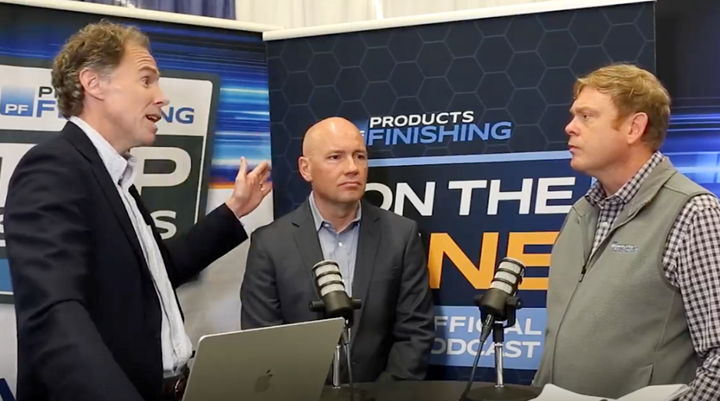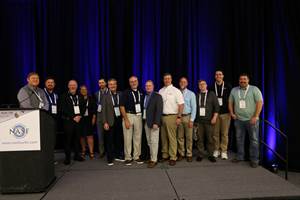Episode 35: Advancing Trivalent Chromium for Functional Coatings
Products Finishing recently caught up with Doug Morrison and Kyle Hankinson of Trion Coatings to hear the latest developments with their SAFEChrome trivalent chromium technology.

Trion Coatings President Doug Morrison and Vice President of Marketing and Sales Kyle Hankinson discussed the company’s latest developments with Products Finishing at SUR/FIN 2023.
Photo Credit: Products Finishing
Recently, Products Finishing attended the 2023 SUR/FIN finishing trade show and technical conference organized by the National Association for Surface Finishing (NASF). Unsurprisingly, one of the big topics of discussion was the increasing adoption of trivalent chromium technologies for finishing applications. One company working to advance the use of trivalent chromium for functional coating applications is Trion Coatings (South Bend, Ind.) with its SAFEChrome technology. SUR/FIN provided a perfect opportunity to catch up with Trion President Doug Morrison and Vice President of Marketing and Sales Kyle Hankinson and learn about the company’s latest developments.
PF: Can you give us an update on Trion and SAFEChrome?
DM: A lot has been happening in the last year. We are working with a team of scientists at the Watervliet Arsenal outside of Albany, New York. The team’s got a dual mission where they are responsible for both production assets of large caliber weapon systems, and also research and development with an organization that’s on base there called the Watervliet Arsenal. The lead chemist is Dr. Joshua Mauer — he’s got a team of four people that have been to our lab in South Bend 15 times since we last met last year. So, there’s been a significant amount of effort and development where we are coming together to look at results that occur over testing that happens between each of those visits. We now have this extension of our technical team, which is six people in South Bend, four additional who are the leads at the Watervliet Arsenal, Benét Laboratories. And they are all supported by several research scientists as well.
We’re working with our partners at KCH Engineering Services to build from lab to production scale at Watervliet Arsenal. The Army has made a commitment to SAFEChrome and has committed to the industry and to the United States taxpayer that its going to get away from hexavalent chrome.
KH: We have several projects underway with KCH associated with the Watervliet Arsenal facility, from large caliber [weapon systems] to some small caliber weapon systems and they’re building us some modules right now. It’s pretty exciting to really take it from the small scale in this kind of simultaneous parallel path of development but also the production scale of the process to meet their production needs in supporting the warfighter in today’s environment.
PF: What are your thoughts on trends that are pushing the industry — both from a regulatory standpoint, but also with regard to emerging applications like electric vehicles (EVs) and mobility solutions?
DM: From a technical and philosophical standpoint of the company and the technology, our intention is for the technology to rest on its own merits. So, it’s going to beat hex chrome or other coatings put in its path. On all of these applications, we’re going to select them for the bundle of things that we can do well today, and the technology is going to continue to develop and then we’re going to do more things in the future.
The regulatory backdrop helps because it opens the door. People want to move away from hexavalent chrome — and we do too, but we want a technology that is doing all the things that hexavalent chrome has done very well for 100 years and do it better. That’s what we’re trying to do as an organization philosophically with the technical aspects of the technology. I think it’s the right thing to do. It’s disruptive for players and stakeholders currently in the industry, right? You know, people have been there for a long time doing what they’re doing. But change happens. A new technology comes along. You have to adapt.
KH: The industry has been trying to make the transition to try for many years now. And some facilities certainly have, especially in California. There are successes that work for a lot of applications. And there are still technology limitations to the process, and then OEM approval spec approval limitations.
I think where [Trion] differs is that we have a foundationally different technology in the use of ionic liquids in our process. While we do use a trivalent chrome to produce plated chrome metal, the foundation of the process is not your typical aqueous chemistry where the existing technologies have been in that space for the past 30 years.
We are very empathetic with the platers — we don’t want to see anyone have to shut down or a facility go out of business. We want to work with [state regulatory] organizations to help them evaluate our technology in that particular state, and then of course, as the regulatory environment moves out of California into other states and potentially down the federal path. We feel like these are all regulatory tailwinds for a new technology. But the most important thing is that it has to perform. It has to meet the needs of the customer. It’s a slow process because there’s a lot of testing involved.
Related Content
Products Finishing Reveals 2023 Qualifying Top Shops
Each year PF conducts its Top Shops Benchmarking Survey, offering shops a tool to better understand their overall performance in the industry. The program also recognizes shops that meet a set of criteria to qualify as Top Shops.
Read More3 Tests to Ensure Parts are Clean Prior to Plating
Making sure that all of the pre-processing fluids are removed prior to plating is not as simple as it seems. Rich Held of Haviland Products outlines three tests that can help verify that your parts are clean.
Read MoreNanotechnology Start-up Develops Gold Plating Replacement
Ag-Nano System LLC introduces a new method of electroplating based on golden silver nanoparticles aimed at replacing gold plating used in electrical circuits.
Read MoreAdvantages to Pumped Eductor Agitation
Not all agitation methods are created equally. Pumped agitation with eductor nozzles can improve process tanks and quickly show a reduction in operating costs while keeping staff safe, following environmental legislation and preventing pollution.
Read MoreRead Next
Trion Coatings Names EVP of Marketing & Sales
Kyle Hankinson to serve as Trion Coatings’ Executive Vice President of Marketing and Sales.
Read MoreTrion Coatings Announces Consultation Agreement With Brad Durkin
Industry veteran Brad Durkin to aid in SAFEChrome market integration for Trion Coatings, a leader in providing alternatives to hexavalent chromium use in decorative and functional applications.
Read MoreTrion Coatings Partners with KCH Services
KCH will act as Trion’s exclusive engineering, procurement and construction provider for the plating technology.
Read More















